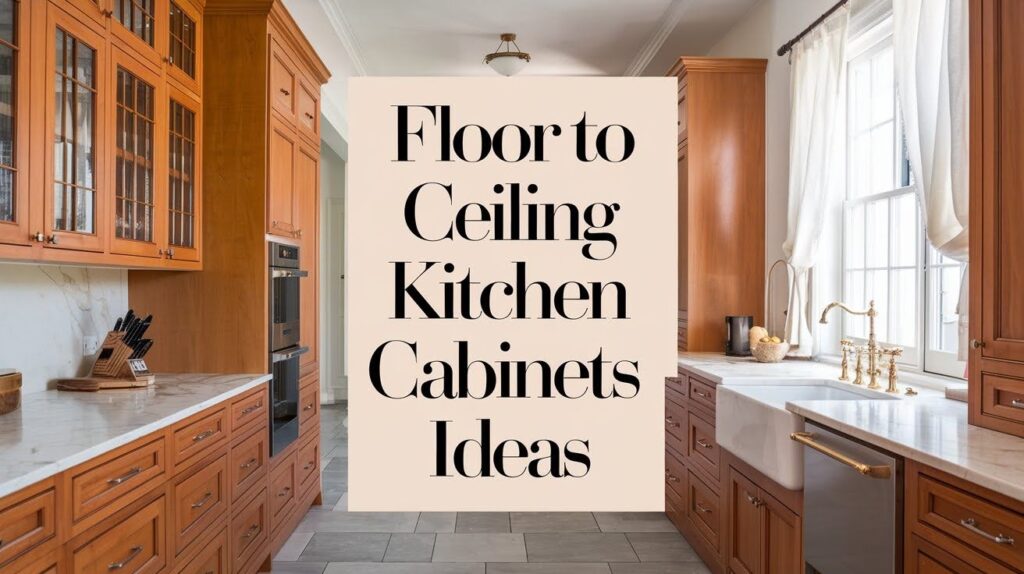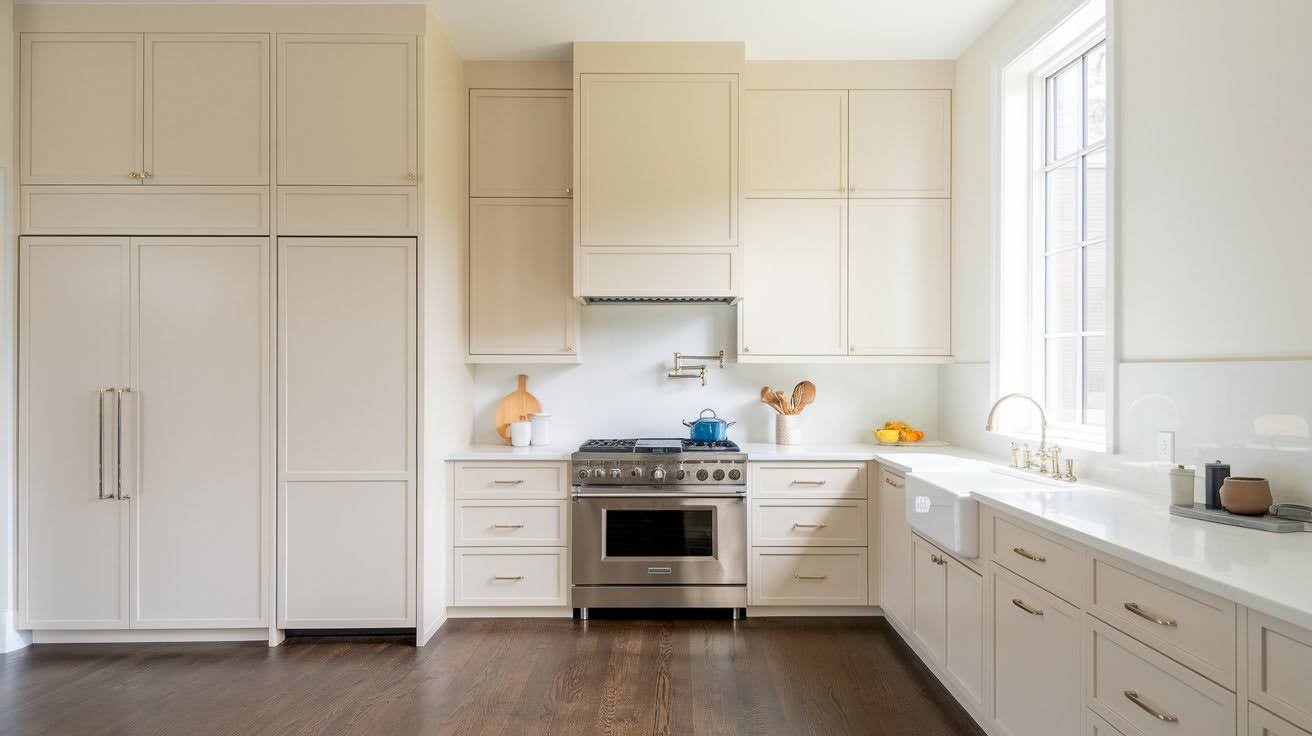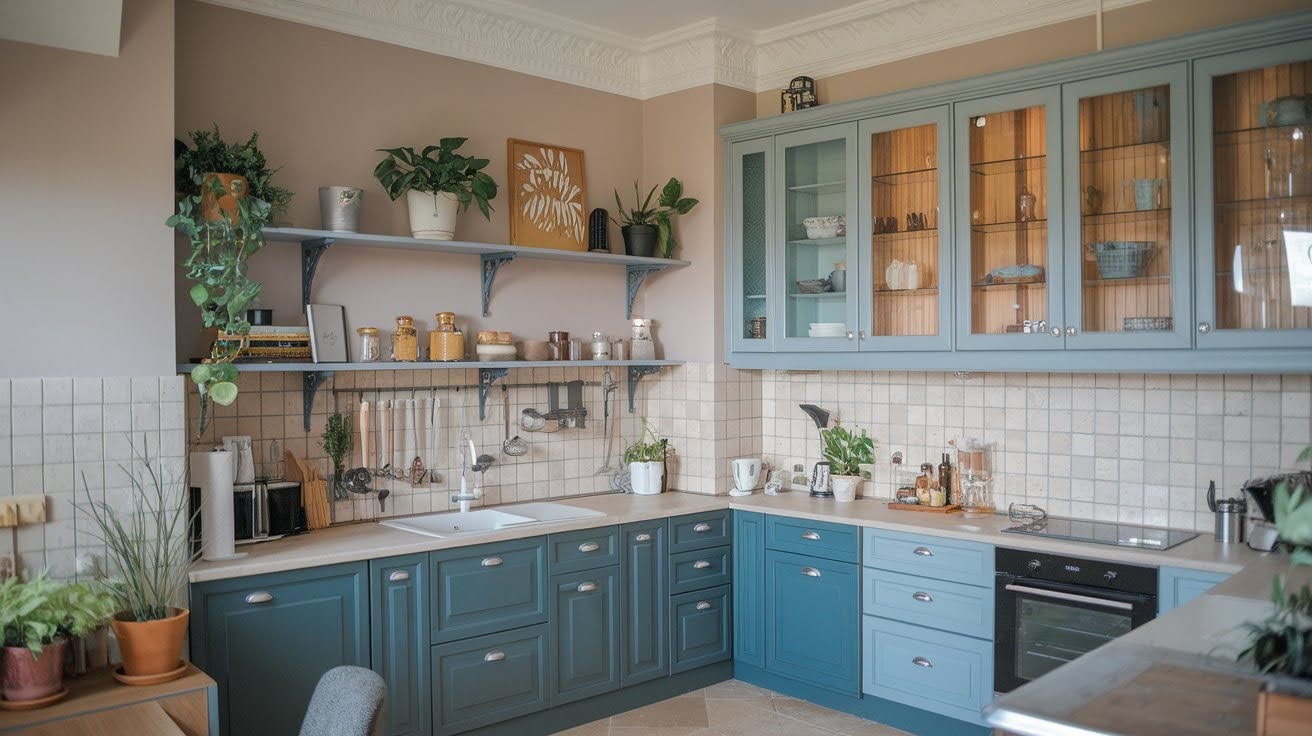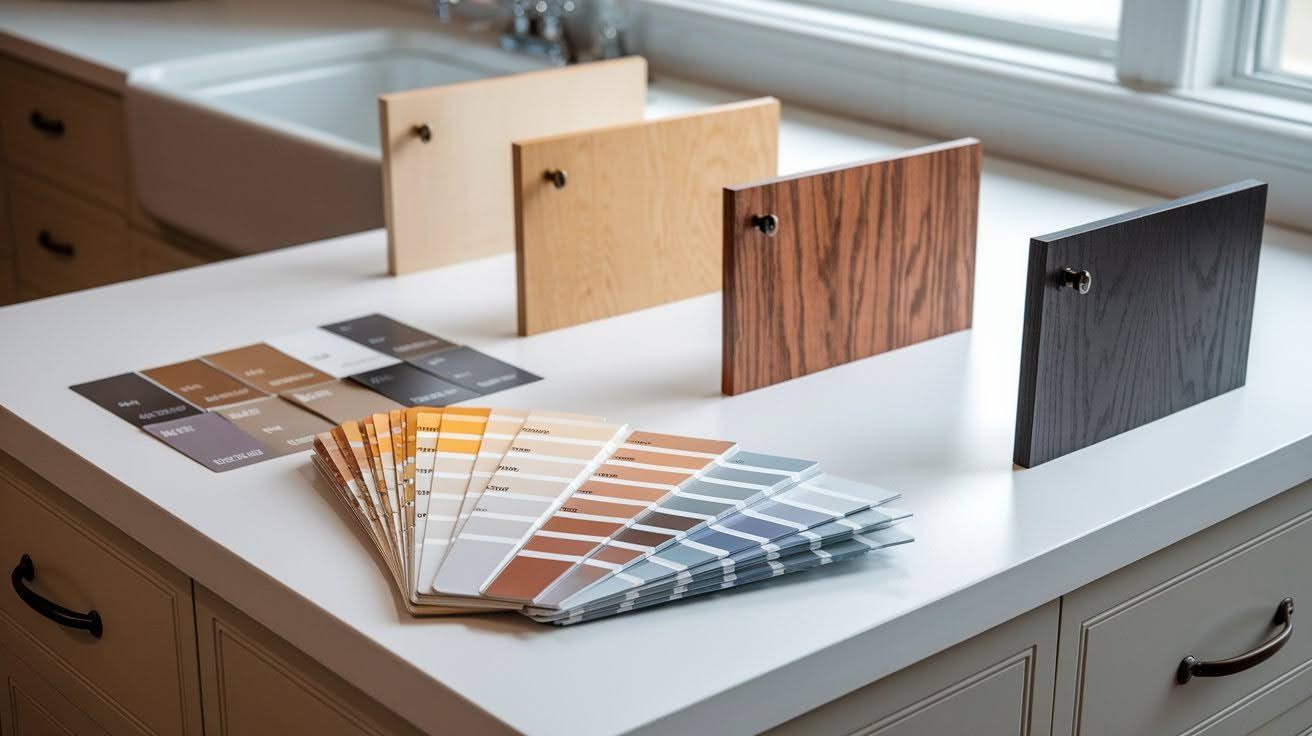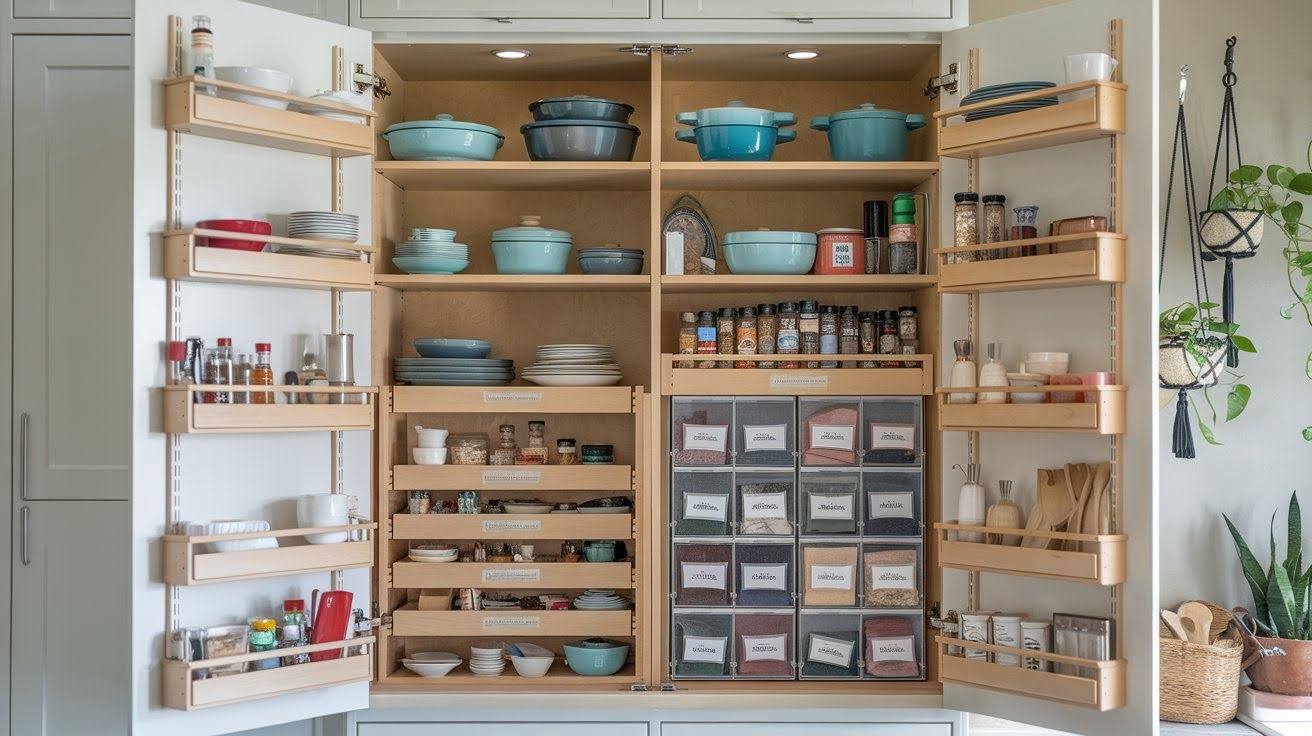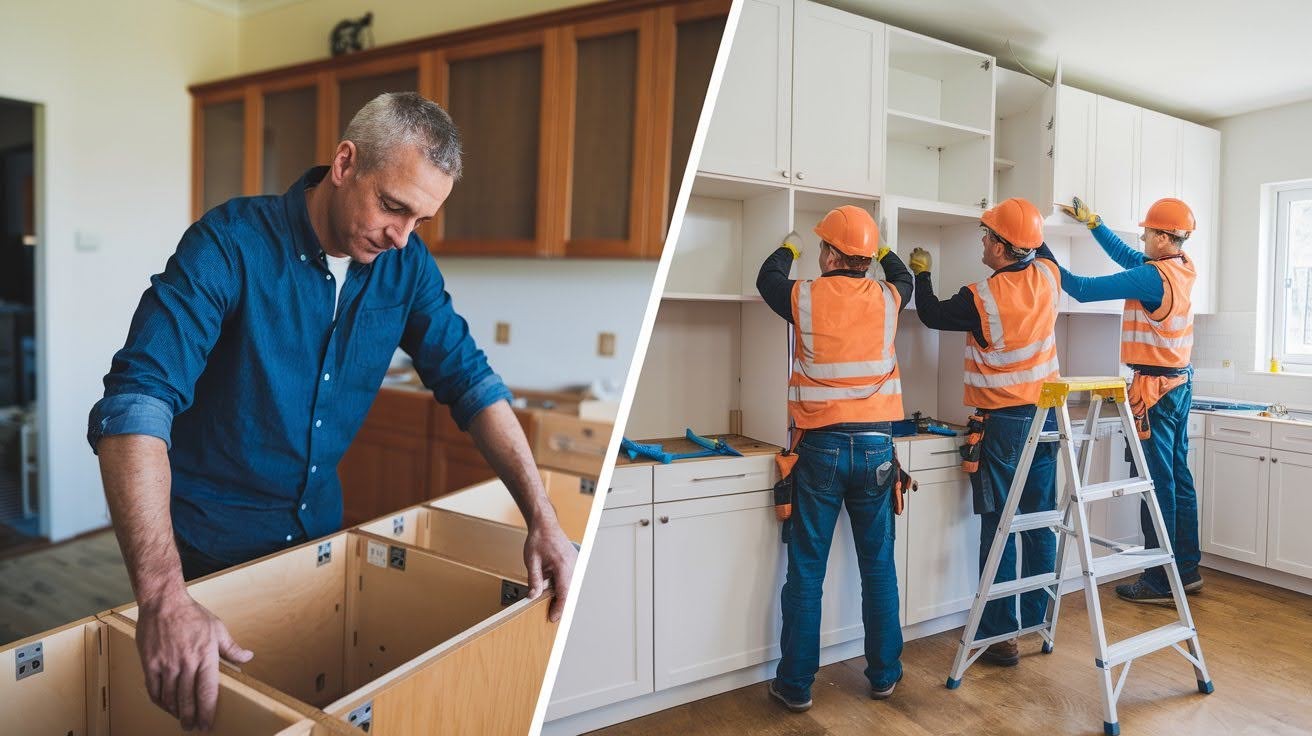Are you tired of running out of kitchen storage space? Floor to ceiling kitchen cabinets might solve your problem.
I’ve helped over 500 families redesign their kitchens in the past years. I keep seeing the same issue everywhere. Wasted space above standard cabinets.
Here’s what you’ll learn in this guide:
Design ideas that work for any kitchen, smart storage tricks for tall cabinets, real cost numbers from my recent projects, options to hire help or do it yourself, simple maintenance tips
I’ll share everything I know about these tall cabinets. No confusing terms. Just straight advice from someone who installs them every week.
By the end, you’ll know if floor to ceiling cabinets fit your kitchen and budget.
What Are Floor to Ceiling Kitchen Cabinets?
Imagine cabinets that go from your floor straight up to your ceiling. No gaps. No empty space above.
That’s what floor to ceiling kitchen cabinets are.
These tall storage units use every inch of vertical space in your kitchen. Regular cabinets usually stop around 8 feet high. These go all the way up.
Most kitchens waste 18-24 inches of space above normal cabinets. That’s a lot of storage you’re missing out on.
Floor to ceiling cabinets capture that space. They give you up to 40% more storage than regular setups.
Think about where you’ll store holiday dishes. Your slow cooker. Extra food items. All that stuff needs a home somewhere.
Design Ideas for Floor to Ceiling Kitchen Cabinets
Let me share some tricks I’ve learned from working on hundreds of kitchens.
The Two Color Approach
Paint your upper cabinets lighter than your lower ones. This creates visual interest without making your space feel heavy.
I like using white or cream on top with navy or gray below.
Glass Front Upper Cabinets
Add glass fronts to your highest cabinets. This makes them feel less overwhelmed and shows off your nice dishes.
Keep only your prettiest items up there. Nobody wants to see mismatched containers.
Mix in Open Shelving
Break up solid doors with a few open shelves. This gives your design breathing room.
Use these spots for cookbooks you actually read, pretty serving pieces, or plants.
Crown Molding Detail
Add crown molding where cabinets meet the ceiling. This makes even basic cabinets look expensive and custom-made.
Choose molding that matches your room’s style. Simple profiles work best in modern kitchens while detailed molding suits traditional spaces.
Materials and Finishes to Consider
Choosing the right materials can make or break your budget.
Wood Choices
Maple is my favorite. It’s strong, takes paint well, and costs less than premium options.
Oak has that classic wood grain look. But it costs more and is harder to paint later.
Cherry wood ages beautifully but costs significantly more upfront.
Laminate Options
Don’t dismiss laminate. Today’s versions look incredible.
High-quality laminate can look like real wood. Guests won’t know the difference. And it costs about half as much.
Paint Colors
White never goes out of style. It makes small kitchens feel bigger and reflects light well.
Pure white can feel cold though. Try warm whites with cream tones instead.
Gray is popular but choose carefully. Some grays look purple in certain lighting.
Hardware Tips
Long pulls work best on tall cabinets. They’re easier to grab and look cleaner.
Skip tiny knobs on big doors. Don’t mix metals randomly. Place hardware where you can reach it easily.
Smart Storage Solutions Inside Tall Cabinets
The real magic happens inside your tall cabinets. Without good organization, you’ll struggle to reach anything above shoulder height.
Pull Down Shelves
These are worth every penny. Press a button and high shelves come down to counter level.
Perfect for dishes, glasses, or anything you use regularly.
Spinning Shelves
Lazy susans make corner cabinets usable. No more losing items in dark corners.
I recommend 18-inch spinning shelves for most upper cabinets.
Upper Cabinet Drawers
You can put drawers in upper cabinets too.
Deep drawers work great for storing baking sheets upright, cutting boards, or large serving platters.
Step Stool Storage
Keep a fold-flat step stool in a base cabinet. You’ll need it for reaching high shelves safely.
Never climb on counters or chairs.
Storage Zones
Store items by how often you use them. Daily dishes and glasses at eye level. Weekly items above eye level.
Holiday stuff on the highest shelves.
Cost Guide: How Much Do Floor to Ceiling Kitchen Cabinets Really Cost?
Let’s talk about real numbers.
| Price Range | Cost Per Linear Foot | What You Get | Best For |
| Budget | $150-250 | Basic laminate cabinets, standard hardware | Rental properties, tight budgets |
| Mid Range | $250-450 | Solid construction, better hardware, wood or quality laminate doors, soft-close hinges | Most homeowners |
| High End | $450-800+ | Custom everything, solid wood construction, premium hardware, all extras | Luxury kitchens |
Hidden Costs
Don’t forget these extras: Installation labor costs $100-200 per cabinet. Crown molding runs $8-15 per linear foot. Interior accessories cost $50-200 per cabinet. Electrical work for lighting costs $200-500.
Budget 20% more than your initial estimate. Projects always cost more than expected.
Installation: DIY vs Professional
I’ve seen both approaches work. And I’ve seen both go wrong.
When DIY Makes Sense
If you’re handy with tools, have time, and your kitchen layout is simple, DIY could work. You’ll save $3,000-8,000 in labor costs. Work at your own pace. Have complete control over the process.
But measuring mistakes are expensive. Heavy cabinets need help. Electrical connections require permits.
When to Hire Professionals
If your ceilings aren’t level, you’re adding electrical work, or you want warranty protection, hire pros.
Professional installers finish in days, not weeks. They handle permits. They fix mistakes on their time.
The Middle Ground
Some homeowners prep and paint cabinets themselves, then hire pros for installation. This can save 30-40% while avoiding the trickiest parts.
Get at least three quotes before deciding. Professional installation might be more affordable than you think.
Benefits of Floor to Ceiling Kitchen Cabinets
Why do I recommend these tall cabinets so often?
- You gain 6-12 cubic feet of storage per linear foot of cabinets
- Buyers love storage and kitchens with maximum storage sell faster
- No dust collecting space above cabinets creates a cleaner look
- Store seasonal items up high and daily essentials at eye level
- Tall cabinets make ceilings look higher and small kitchens feel bigger
Maintenance and Cleaning Tips
Here’s how to keep your tall cabinets looking great.
Regular Dusting
Use a microfiber cloth on an extendable handle. Dust weekly to prevent buildup.
Spray your cloth with furniture polish for better results.
Deep Cleaning
Clean cabinet faces monthly with gentle wood cleaner or mild soap solution.
Avoid harsh chemicals that damage finishes. Don’t soak wood with too much water. Skip abrasive scrubbers that leave scratches.
Hardware Care
Tighten loose hinges and pulls every six months. Oil hinges annually to keep them working smoothly.
Interior Organization
Reorganize high shelves seasonally. Move items you don’t need to the very top.
Use clear containers so you can see what’s stored up high.
Common Mistakes to Avoid
Learn from other people’s expensive mistakes.
- Measuring ceiling height in only one spot instead of multiple locations
- Installing cabinets without planning interior organization first
- Choosing pretty cabinets that don’t meet your actual storage needs
- Buying cheap hinges and drawer slides to save money upfront
- Forgetting to plan proper lighting inside tall cabinets
Conclusion
Floor to ceiling kitchen cabinets changed how I think about kitchen storage. They’ll change yours too. I’ve watched countless families go from cluttered counters to organized kitchens. The results are incredible every single time.
Here’s my advice: Start with accurate measurements. Plan your interior storage carefully. Choose materials within your budget.
Don’t rush this decision. Good kitchens take proper planning time.
Remember these points: You’ll gain up to 40% more storage space. Your home value will increase. Daily kitchen life becomes easier.
I install these systems weekly because they work. Homeowners love the extra storage and clean appearance. Take action now. Measure your kitchen height. Research local installers. Your organized kitchen awaits.
Frequently Asked Questions
Can I add floor to ceiling cabinets to my existing kitchen?
Yes, but you’ll need to remove your current upper cabinets first. I recommend hiring professionals since electrical and plumbing lines often run above existing cabinets.
Do floor to ceiling cabinets make small kitchens look cramped?
Actually, they make small kitchens look taller and more spacious. The key is choosing lighter colors and adding proper lighting to prevent a closed-in feeling.
How do I reach items stored in the highest cabinets safely?
Install pull-down shelving systems or keep a quality step stool nearby. I always tell my clients to store only seasonal items in the very top sections.
Are floor to ceiling cabinets worth the extra cost?
Absolutely, especially if you plan to stay in your home for more than five years. The added storage and increased home value typically offset the higher upfront investment.
What’s the biggest mistake people make with tall kitchen cabinets?
Not planning interior organization before installation. Many homeowners end up with beautiful cabinets they can’t use effectively because they didn’t consider what they’d actually store inside.

